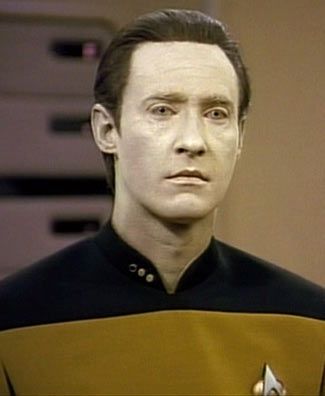This article was originally published at my Liberty.me blog, here.
There are a handful of characters that you can persuade to become your companion in Fallout 3. The majority are based on Karma - if you're too good or too evil, potential companions will just rebuff you when you speak with them about it. One of the few potential companions that doesn't come with a Karma requirement - and who happens to be my favorite companion - is the ghoul, Charon.
Ghouls are basically irradiated humans - at one time or another, they suffered intense, prolonged radiation sickness. Normally, humans die from this, but due to a genetic anomaly, some survived. They look like zombies - their skin is decayed, and possibly, their ligaments. Their lifespans are greatly extended, and they may be immune to (or even healed by) radiation. In Fallout lore, ghouls are the result of radiation alone, consistent with the understanding of the science of radiation in the 1950's.
There are two kinds of ghouls - feral ghouls and intelligent ghouls. Ferals have essentially "gone mad":  they have lost all reasoning capability, and will attack any non-ghoul. Intelligent ghouls act much like normal humans, but tend to form their own communities and seek out their own kind. Humans in the Fallout universe, for the most part, discriminate against ghouls. Some don't, but epithets like "zombie" and "shuffler" aren't uncommon to hear among humans in the game when they're talking about ghouls, intelligent or not.
they have lost all reasoning capability, and will attack any non-ghoul. Intelligent ghouls act much like normal humans, but tend to form their own communities and seek out their own kind. Humans in the Fallout universe, for the most part, discriminate against ghouls. Some don't, but epithets like "zombie" and "shuffler" aren't uncommon to hear among humans in the game when they're talking about ghouls, intelligent or not.
 they have lost all reasoning capability, and will attack any non-ghoul. Intelligent ghouls act much like normal humans, but tend to form their own communities and seek out their own kind. Humans in the Fallout universe, for the most part, discriminate against ghouls. Some don't, but epithets like "zombie" and "shuffler" aren't uncommon to hear among humans in the game when they're talking about ghouls, intelligent or not.
they have lost all reasoning capability, and will attack any non-ghoul. Intelligent ghouls act much like normal humans, but tend to form their own communities and seek out their own kind. Humans in the Fallout universe, for the most part, discriminate against ghouls. Some don't, but epithets like "zombie" and "shuffler" aren't uncommon to hear among humans in the game when they're talking about ghouls, intelligent or not.
One of these ghoul communities is Underworld, in the Museum of History. This settlement has what most settlements in the Capital Wasteland have - a trading post, a restaurant, a clinic, and a bar. In the bar, you'll find a slimy car salesman-type ghoul bartender (and owner), Ahzrukhal. You'll also find an unusually tall, quiet, vaguely menacing bouncer standing in a corner, named Charon (he stands more than a head taller than humans and ghouls in the game, making him approximately seven feet tall).
When you speak with Ahzrukhal about the guy in the corner, he'll tell you that he was brainwashed to do the bidding of whoever holds his contract, without question. If you choose to define this as slavery, he'll tell you that Charon did something to land himself there - he doesn't say what.
If you're in need of a companion, you can ask about the contract, and you'll be given a choice: offer money, or kill the bar owner's primary competition. Obviously, paying is the more morally upright option - but the price is pretty steep (depending on your Barter skill, it can be up to 2,000 caps, which you may not have at the moment). The discussion of how much money a man is worth is abhorrent to the nth degree, but it's better than killing a complete innocent. On the other hand, by the time you get to Underworld, you've killed quite a few people and may have made several morally dubious choices that doesn't leave killing another person out of the question.
Either way you choose, you get the contract.
As soon as you inform Charon that you're his new employer, he promptly executes his former boss. Since he wasn't a wonderful person anyway, it's no great loss. After the deed is done, he turns to you and says:
Ahzrukhal was an evil bastard. So long as he held my contract, I was honor bound to do as he commanded. But now you are my employer, which freed me to rid the world of that disgusting rat. And now, for good or ill, I serve you.
...and (provided you don't already have two companions), he'll follow you out into the wasteland, and help you kick butt.
The Moral Quandary: Since he has no choice but to obey whoever holds his contract, you've  essentially bought yourself a slave. Congratulations, Scum of the Earth!
essentially bought yourself a slave. Congratulations, Scum of the Earth!
 essentially bought yourself a slave. Congratulations, Scum of the Earth!
essentially bought yourself a slave. Congratulations, Scum of the Earth!
I'm sure that most people will agree with me: slavery is wrong. End of story. BUT - It could be somewhat justifiable in this situation. If your character has good karma, it could be reasoned that a good slave-owner is better than a bad slave-owner, and you got him out of a really crappy situation. It wouldn't be too big of a stretch to assume that being somehow compelled to follow the orders of someone you abhor is absolutely soul-crushing.
Another thing to think about is the extended ghoul lifespan - he'll probably be around when you die, having aged little. The contract would have to change hands again, and my guess is that people who are totally fine with owning other people usually don't tend to be the most kind or charitable souls. The man is essentially a weapon, someone who is compelled to follow orders without question, even if he disagrees with them.
Another wrinkle? He cannot hold his own contract, and it's implied that you can't destroy it, either, so those two options are out. So, this is all grey-area here. There is no black-and-white. There is no "good" decision; you have to choose the "least bad" decision - whatever that may be.
Man of Mystery
Now, there's a lot of interesting questions about Charon that aren't answered in the game, namely:
- How old is he? At the time of Fallout 3, there were still ghouls around that saw the bombs drop 200 years before, so he could be very old or he could have went through the change fairly recently, we don't know.
- Where did he get the name 'Charon'? It's likely not the name he was born with. If you've ever studied Greek mythology, you'd note that Charon (or Kharon) is the ferryman of Hades who carried souls of the dead across the rivers Styx and Acheron (the rivers dividing the world of the living and the world of the dead). Apt, for someone of his stature and profession.
- Where/when did he receive his combat training? Before the war? After? Who knows?!
- Who brainwashed him in the first place? That would be interesting to find out. Inquiring minds...
- What unspeakable crime could justify brainwashing someone into being a perpetual slave? I couldn't even venture a guess.
- What brainwashing technique did they use? As most disgruntled veterans will tell you by their very existence, "brainwashing" requires maintenance - you can't just put suggestions into someone's head, wave goodbye, and that's that. Brainwashing requires "reconditioning" from time to time - and there's no indication that this happens with Charon, so there's something really weird going on here.
- Why rely on a contract - either a piece of fragile paper, or a holotape vulnerable to technological obsolescence - as a method of control? Why not a key, a plastic card, or an engraved piece of jewelry? I'm sure the use of a contract would make it easier to transfer him from person to person, but so would just about any other physical object. It does offer a thin veneer of legitimacy, at least to those who designed it, I suppose.
- Why is the contract perpetual, instead of specifying an end date? Most contracts have a time period for which they are valid. After the time period expires, the contract is void.
To make it even more heartbreaking, there are no companion quests in Fallout 3 - so the game offers no way to free him from his contract. So, even if you do get him away from his awful previous employer, you're still left being unable to absolve yourself of having become a slave-owner in the first place.
Parting Thoughts...
There's an enthusiasm among Fallout players for their canine companion, Dogmeat - an enthusiasm I have to admit that I don't share. Sure he's cute, but he doesn't carry a gun, which makes him next to useless in combat (in my humble opinion). You always have to worry about him dying, which is why I tend to leave him at "home base" - wherever that might be. That said, when he does die, I don't get all misty-eyed and weepy like some Fallout players.
I do get that way about Charon for a simple reason: the man isn't with you because he wants to be - he's with you because he HAS to be. It's bad enough being the owner of a human being (or, well, what used to be a human being), but I feel guilty when he dies trying to protect me. I feel attached to him, as if he were an indispensable possession - which is strange, that being completely at odds with how I feel about people being treated as property. When he's my companion, it really feels like we're a team - he doesn't kill all the enemies before I can get to them like some companions, and if there's something he can't handle with his trademark modified combat shotgun, I'm there to help him out. When he's not there, I miss his witty banter - wandering the wasteland just isn't the same without him.
Despite so little being known about him - or perhaps because of it - I feel that Charon is a character that has great depth and nuance. It's painful that there is so little you can do for him - and that in doing so, you risk violating your own moral code. If you really think about it, selling your own soul to save another is a messy business, even in a video game.












